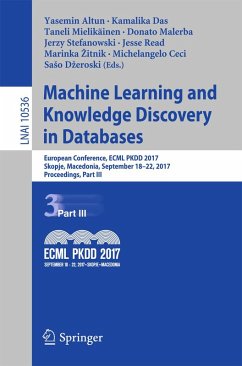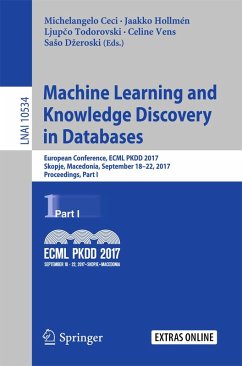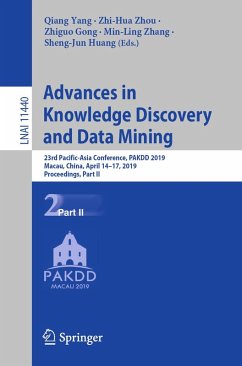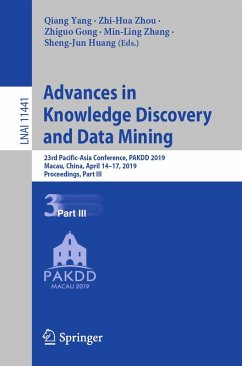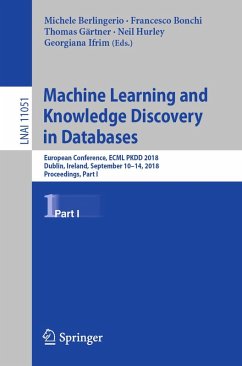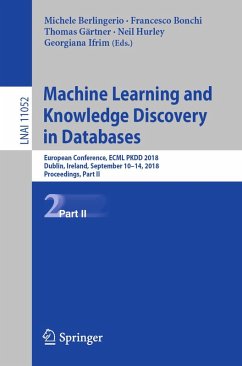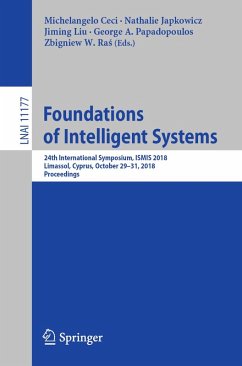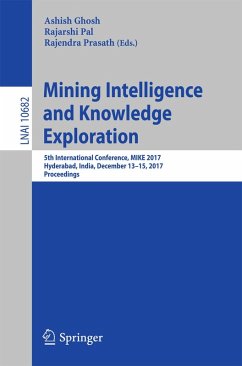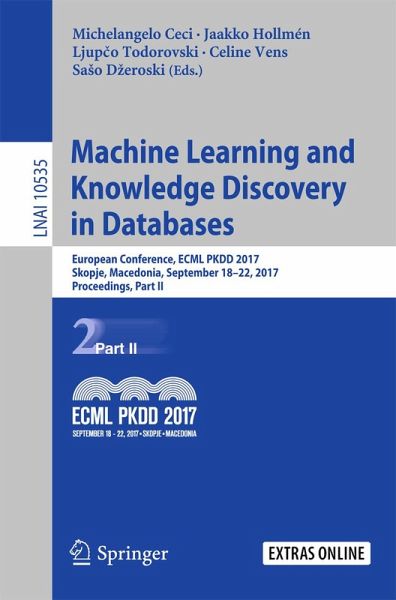
Machine Learning and Knowledge Discovery in Databases (eBook, PDF)
European Conference, ECML PKDD 2017, Skopje, Macedonia, September 18-22, 2017, Proceedings, Part II
Redaktion: Ceci, Michelangelo; Dzeroski, Saso; Vens, Celine; Todorovski, Ljupco; Hollmén, Jaakko
Versandkostenfrei!
Sofort per Download lieferbar
40,95 €
inkl. MwSt.
Weitere Ausgaben:

PAYBACK Punkte
20 °P sammeln!
The three volume proceedings LNAI 10534 - 10536 constitutes the refereed proceedings of the European Conference on Machine Learning and Knowledge Discovery in Databases, ECML PKDD 2017, held in Skopje, Macedonia, in September 2017. The total of 101 regular papers presented in part I and part II was carefully reviewed and selected from 364 submissions; there are 47 papers in the applied data science, nectar and demo track.The contributions were organized in topical sections named as follows: Part I: anomaly detection; computer vision; ensembles and meta learning; feature selection and extractio...
The three volume proceedings LNAI 10534 - 10536 constitutes the refereed proceedings of the European Conference on Machine Learning and Knowledge Discovery in Databases, ECML PKDD 2017, held in Skopje, Macedonia, in September 2017.
The total of 101 regular papers presented in part I and part II was carefully reviewed and selected from 364 submissions; there are 47 papers in the applied data science, nectar and demo track.
The contributions were organized in topical sections named as follows: Part I: anomaly detection; computer vision; ensembles and meta learning; feature selection and extraction; kernel methods; learning and optimization, matrix and tensor factorization; networks and graphs; neural networks and deep learning. Part II: pattern and sequence mining; privacy and security; probabilistic models and methods; recommendation; regression; reinforcement learning; subgroup discovery; time series and streams; transfer and multi-task learning; unsupervised and semisupervised learning. Part III: applied data science track; nectar track; and demo track.
The total of 101 regular papers presented in part I and part II was carefully reviewed and selected from 364 submissions; there are 47 papers in the applied data science, nectar and demo track.
The contributions were organized in topical sections named as follows: Part I: anomaly detection; computer vision; ensembles and meta learning; feature selection and extraction; kernel methods; learning and optimization, matrix and tensor factorization; networks and graphs; neural networks and deep learning. Part II: pattern and sequence mining; privacy and security; probabilistic models and methods; recommendation; regression; reinforcement learning; subgroup discovery; time series and streams; transfer and multi-task learning; unsupervised and semisupervised learning. Part III: applied data science track; nectar track; and demo track.
Dieser Download kann aus rechtlichen Gründen nur mit Rechnungsadresse in A, B, BG, CY, CZ, D, DK, EW, E, FIN, F, GR, HR, H, IRL, I, LT, L, LR, M, NL, PL, P, R, S, SLO, SK ausgeliefert werden.



